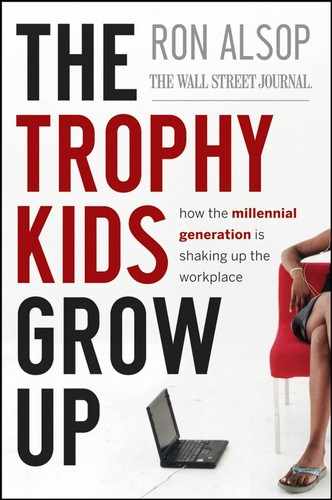1.3. BENETTON GENERATION
As more millennials move into the workplace, it's starting to resemble a Benetton advertisement of many colors and cultures. Because this is such an ethnically and racially mixed generation, it could signal major strides in diversifying the middle and upper management ranks of corporate America. In a study of U.S. college freshman trends, the Higher Education Research Institute at the University of California at Los Angeles found particularly sharp jumps in the proportion of Asian students, 8.6% in 2006, compared with 0.6% in 1971, and Latino students, 7.3%, up from 0.6%. Over the same period, the share of white students fell from 90.9% to 76.5%.
There is also a gender shift under way, with girls and young women accounting for a growing share of college and graduate school enrollments and taking on more leadership roles in companies. According to the UCLA freshman study, 55% of students are now women.
Having grown up with greater diversity in their neighborhoods and schools, millennials tend to be more open and accepting of each other, regardless of gender, color, religion, or sexual orientation. Multiracial and multicultural friendships are commonplace. UCLA reports that in its 2007 freshman survey, 37% of students said that helping promote racial understanding is a personal goal of theirs, the highest level since 1994.
Millennials also are more positive than older generations about such divisive social issues as gay marriage, interracial dating, and immigration. The Pew Research Center found that 47% of 18- to 25-year-olds favor legalization of gay marriage, compared with only 30% of people over 25. Similarly, 61% of the younger group believes that gays and lesbians should be able to adopt children, whereas only 44% of older people concur.
As for interracial dating, 89% of 18- to 25-year-olds consider it acceptable, whereas 70% of people over 25 approve. And when asked whether the growing number of immigrants strengthens American society, two-thirds of 18- to 25-yearolds said yes, compared with 57% of 26- to 40-year-olds, 47% of 41- to 60-year-olds, and 38% of those over 60.
To be sure, there are still class and cultural differences among the millennials. But the racial and ethnic tensions are likely to be much less pronounced with this generation than with older Americans. Millennials favor a corporate culture of inclusion and tolerance and will gravitate toward companies that actively promote racial and cultural diversity. "We're finding young people we hire much more progressive on workplace issues," says William Margaritis, the head of corporate communications and investor relations at FedEx Corp. "They want to know up front about a company's commitment to diversity."
Danielle Beyer certainly does. She graduated from a high school with dozens of nationalities and then attended the internationally diverse University of Rochester in New York. "At a time when whom you do business with is no longer limited by countries' borders, a diverse workforce is important to me," says Beyer, who joined the financial services company National City Corp. after receiving her M.B.A. degree from Rochester. "I've always liked having the opportunity to ask a peer or coworker about the places they've been and how they got to where they are today."
Beyond the cultural diversity within their own ranks, the millennials also have developed a worldliness that will serve them well in the increasingly global economy. These days, recruiters say, it's the rare resume from a millennial that doesn't include at least a summer of study overseas, as well as volunteer work in developing nations, interesting pleasure trips to exotic lands, and fluency in at least one foreign language. In the 2007 UCLA study of freshmen, 52% said they were interested in understanding other cultures and countries better, up from 43% in 2002. And in Harris Interactive's youth study, 8- to 21-year-olds listed traveling the world and speaking another language as their top two ambitions.
"It used to be unusual to see students who had taught in other countries or been involved in groups like the Peace Corps or Habitat for Humanity, but now we're interviewing many with international experiences that amount to much more than just vacations abroad," says John Ventola, cochairman of the hiring committee and summer program at the law firm Choate, Hall & Stewart in Boston. "Their open-minded view of the world is a very valuable attribute for lawyers, who shouldn't think about things rigidly but should take into account different viewpoints. That's what diversity is really all about."
